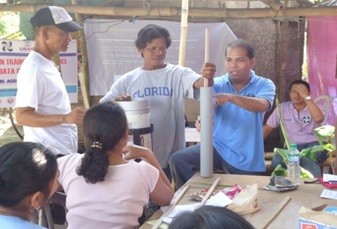
The Bicol River Basin is highly vulnerable to the impacts of floods, droughts, and typhoons. Impacts of climate change and variability have resulted in the inequitable distribution and inadequate supply of irrigation water, affecting rice production and sharing of water resources in the watersheds of Lake Buhi-Barit in Camarines Sur and Quinale A in Albay.
The project, also known as the Bicol Agri-Water Project (BAWP) will run for five years to address these challenges by improving the management of irrigation water. With Php 61.5 million funding ($1.5 million) from USAID, BAWP is being implemented by the University of the Philippines Los Baños Foundation, Inc. to achieve the following outcomes:
- Capacities of farmers to adapt to climate variability and change enhanced
At the farm level, BAWP conducts activities that increase the knowledge and skills of farmers to integrate climate change adaptation in farming to improve harvests. It conducts climate field schools, demonstrates climate resilient agricultural technologies, and establishes small scale irrigation systems.
- Decision support tools (DST) for adoption by farmers and other stakeholders developed
Using a watershed approach, BAWP works to develop agro-climate tools to support decisions for managing climate risks at the farm level and for managing water resources at the watershed level. For example, BAWP installed rain gauges in strategic sites and trained farmers to collect rainfall data as a critical input to the DST. The DST will provide farmers with seasonal climate outlook and extension advisories to guide their farming decisions. The DST also includes a Water Evaluation and Planning (WEAP) model that will guide water resource allocation and help minimize the effects of climate hazards on lowland rice farming communities. DST information will be accessible to users through an online knowledge sharing portal. Complementary training programs are building the capacity of stakeholders to use and apply DST.
- Climate risk resilient water governance capacities strengthened
BAWP strengthens capacity for climate-resilient water governance by analyzing the policy and institutional landscape of the study watersheds, conducting training activities on policy analysis and advocacy, and supporting the preparation of local ordinances and sub-watershed level agreements.
BAWP’s activities are done in partnership with International Research Institute for Climate and Society of Columbia University; the Department of Agriculture-Regional Field Office 5; Bicol University College of Agriculture and Forestry; Central Bicol State University of Agriculture; Provincial Governments of Albay and Camarines Sur; the Municipal Governments of Buhi and Nabua, Camarines Sur and Polangui, Albay; Department of Environment and Natural Resources Region 5; National Irrigation Administration Region 5; National Power Corporation Region 5; Philippine Atmospheric, Geophysical & Astronomical Services Administration Region 5; University of the Philippines Los Baños; Irrigators’ Associations in Quinale A; and Buhi-Barit Watersheds.
GOAL
Enhance climate change adaptation for food security in the Bicol region.
OBJECTIVES
Improve irrigation water management by realizing three intermediate results or outcomes:
- Capacity of farmers to adapt to climate variability and change enhanced;
- Decision support tools for adoption by farmers and other stakeholders developed; and
- Climate risk resilient water governance capacities strengthened.







Comment
Make a general inquiry or suggest an improvement.